How to Fix the System Battery Voltage is Low Error on Windows?
The “System battery voltage is low” error is a problem which affects many different Windows versions and it often appears randomly on users’ computers. The problem appears during the BIOS boot screen and it prevents your computer from loading the operating system at all.
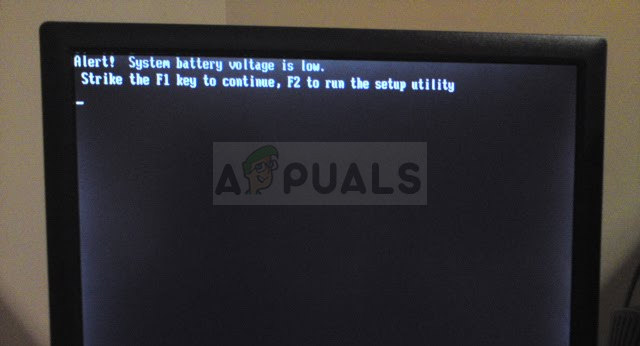
The “System battery voltage is low” error can usually be resolved easily enough but it certainly involves some advanced troubleshooting since everything needs to be done without the help of your operating system. This is yet another reason to follow the instructions carefully in order to keep your PC safe from triggering other problems. We have gathered several methods which have helped other people in the past so make sure you check them out below!
What Causes the “System battery voltage is low” Error on Windows?
There aren’t many unique causes of this error and they are pretty much related to BIOS or the CMOS battery. Still, two distinct causes can be identified and all the methods below are based upon them:
- Your CMOS battery needs to be reinserted or replaced –If the batter has fallen out of its socket a bit, it may weaken the voltage supplied and the error will appear. Also, a CMOS battery won’t last a lifetime and after several years, they are unable to provide the sufficient voltage needed to start BIOS and this problem appears. Considering reinserting or replacing it for a new one.
- BIOS settings are faulty – The problem can also be caused by wrong BIOS settings which may be related to new devices you might have added. Anyway, clearing the System Event Log or updating BIOS should be enough to resolve the problem.
Solution 1: Reinsert or Replace Your CMOS Battery
One of the major causes of this problem is the CMOS battery. If the battery has been moved even slightly from its socket, the error might appear and prevent your PC from booting. If the battery is a couple of years old, it won’t be able to provide sufficient voltage to CMOS and this error is bound to occur. This is a clear sign that it’s time to replace the battery with a new one. These batteries are not expensive and you can’t boot your computer without them so make sure you follow the instructions below!
- Open the computer case and find the CMOS battery attached to the computer’s motherboard. If you are unable to find your CMOS battery, refer to your motherboard or computer documentation. You can also look it up on the Internet or contact your computer’s manufacturer for additional help.
Note: With some computers, you may need to disconnect cables, remove drives, or remove other parts of the computer to get physical access to the CMOS battery.
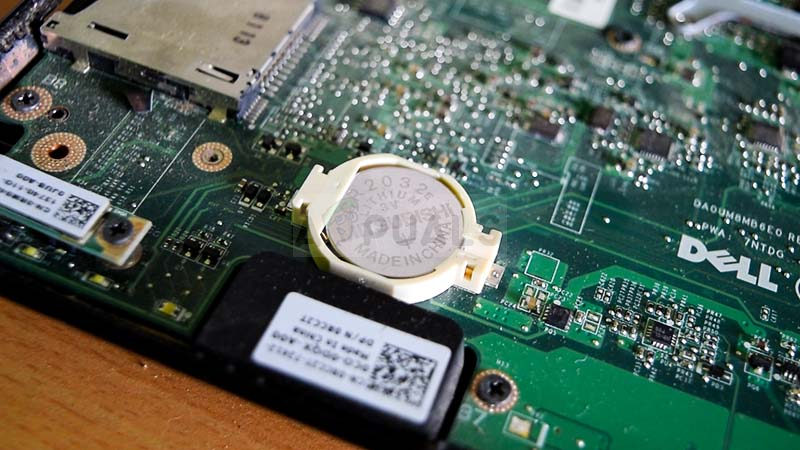
- If your computer is using a coin cell battery, removing the battery is relatively simple. Use your fingers to grab on the edge of the battery and pull it up and out of the socket holding it in place. Some motherboards have a clip holding the battery down and you may need to lift it up to pull the battery out.
- Let it stay removed for 10 minutes, so either reinsert the same one or use a different CMOS battery, input it in a similar manner, and try to boot your computer. Check to see if the “System battery voltage is low” error pops up!
Solution 2: Clear the System Event Log
Another major cause of this problem is faulty BIOS settings. BIOS settings don’t get corrupt too often and it’s always a problem when they do. It may have been caused by an incorrect BIOS update or it can even be caused by a malicious program. Either way, if you can access BIOS, resetting it to default should definitely resolve the problem!
- Turn your PC on and try to enter BIOS settings by pressing the BIOS key as the system is about to start. The BIOS key is typically displayed on the boot screen, saying “Press ___ to enter Setup.” or something similar. There are other keys as well. The usual BIOS keys are F1, F2, Del, etc.
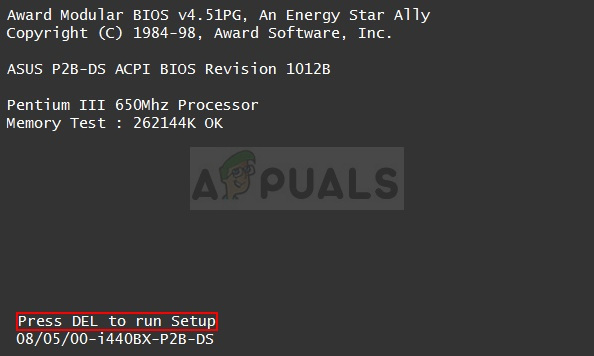
- The option to clear the system event log can be present under several different places in the BIOS screen depending on the version of the BIOS on your computer.
- At the initial screen of BIOS settings, you should navigate to the Advanced tab and look for the System Event Log, Clear Event Log or the Clear System Event Log If it’s not located in the Advanced tab, make sure you search for it further Use the arrow keys to navigate
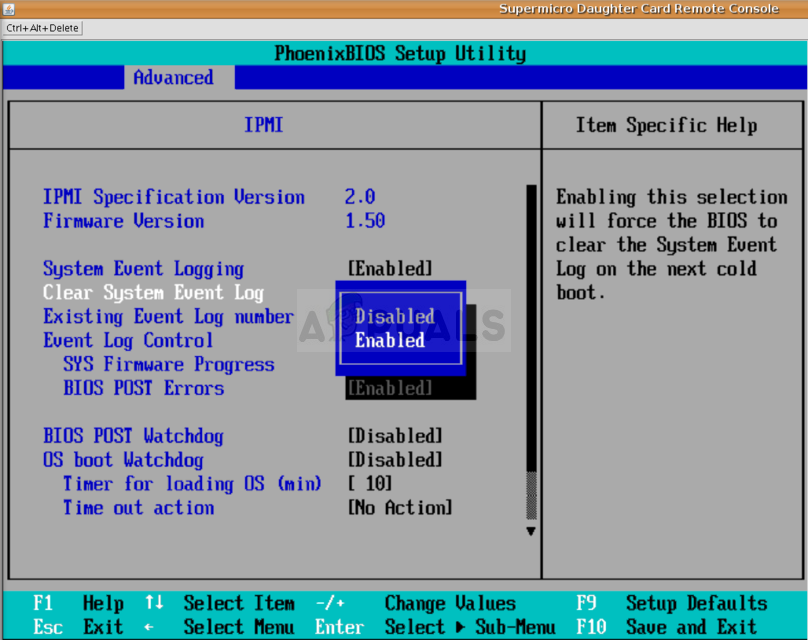
- Click the Clear System Event Log option using the Enter Click the Enter key once again when prompted to confirm your choice and wait for your computer to boot. Check to see if the problem is gone now.
Solution 3: Update BIOS on Your Computer
Updating BIOS may be a difficult way of resolving the problem but users have reported that it has helped them. Note that the process differs from one manufacturer to another so make sure you take that into account. Follow the instructions below in order to install the latest version of BIOS on your computer and, hopefully, resolve the “System battery voltage is low” error!
- Find out the current version of BIOS utility you have installed on your computer by typing “msinfo” in the search bar or the Start menu.
- Locate the BIOS version data just under your Processor model and copy or rewrite anything to a text file on your computer or a piece of paper.
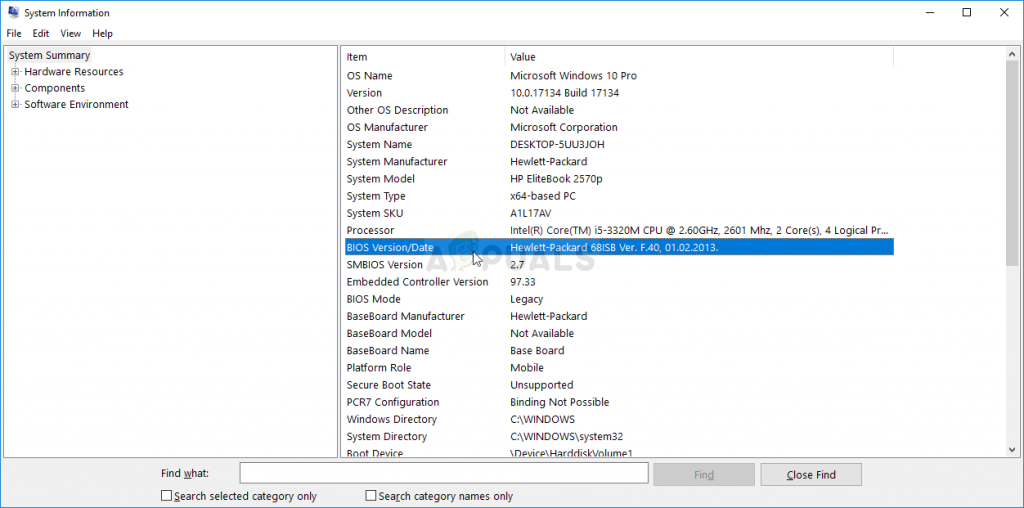
- Find out whether your computer was bundled, pre-built or assembled manually. This is very important because you don’t want to use BIOS made for just one component of your PC when it won’t apply to your other devices and you will overwrite BIOS with a wrong one, leading to major errors and system problems.
- Prepare your computer for the BIOS update. If you are updating your laptop, make sure its battery is fully charged and plug it in the wall just in case. If you are updating a computer, it’s advisable to use an Uninterruptible Power Supply (UPS) to make sure your computer doesn’t shut down during the update because of a power outage.
- Follow the instructions we prepared for various desktop and laptop manufacturers such as Lenovo, Gateway, HP, Dell, and MSI.





